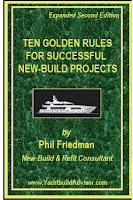From Douglas Sharp (Douglas Sharp Yacht Design, Inc., San Diego, CA, USA):
“I read your e-book with great interest, and appreciate you sending it to me. The school of hard knocks has certainly taught us many of the lessons alluded to in your book, and I heartily agree with your conclusions and advice… Our industry needs to pay attention to hard won accumulated experience.”
From Stephen Moon (Board Certified Admiralty and Maritime Law Specialist, Stephen M. Moon, P.A., Cocoa, FL, USA):
“Your e-book is excellent. I should have been doing a lot of other things this morning but I could not resist reading the e-book as soon as I had a break… Your remarks are very insightful and will be appreciated by many. I have a much better understanding of the events leading up to the actual build process and the important issues to consider before construction now. Your e-book is a quick, must read for anyone involved in a new build project or major refit.”
From Harry Jorgenson, (Jorgensen Marine Ltd, Atatu, Auckland,.NZ):
“Having been involved with large yacht building since the late 70s in varying roles I understand your 10 Golden Rules better than most. It is the most sensible advice that I have read for some time and should be essential reading for all involved.”
From Diane M. Byrne (Editor, Megayacht News, www.megayachtnews.com):
“I've just finished reading your eBook, and it contains sage advice for owners and their team of advisers.”
From Kenny Wooton (Editor-in-Chief, Yachts International magazine):
“Each “rule” is explored in clear, concise prose easily accessible to non-experts.” My sincere thanks and genuine appreciation goes out to all who have taken the time to read the eBook and send their comments. .
For your FREE copy of TEN GOLDEN RULES FOR SUCCESSFUL NEW BUILD PROJECTS, email Phil@YachtBuildAdvisor.com, and insert “eBook” on the subject line.



